This is a short animated film created by the very talented American-born-now-UK-resident writer and film maker Molly Brown called The Evil Table. I loved seeing this – it’s beautifully imagined, and rather clever, and just very funny. ‘Like’ it on Youtube in time for Hallowe’en and Molly gets her film shown at the Mayhem horror film festival in Nottingham next week – which would be great to see.
Month: October 2012
I just wanted to say a massive thank you to everyone who came to my ‘thing’ at the BSFA meeting in Holborn last night. You were a marvellously generous audience and it was a delight to be there. It was great to put some more faces to some more names, and many apologies to those people (too many) that I never got to say hi to or spend enough time with – see you for more chats at Eastercon I hope.
Huge thanks to the BSFA for inviting me to be a guest – it was an honour and a privilege. And thanks most of all to Niall Harrison, whose thoughtful preparation for the event, insightful questioning and calm presence did everything to make me forget how nervous I’d been and simply enjoy a conversation and discussion on those subjects that mean most to me in an environment that couldn’t have been friendlier or better informed.
We also learned last night that Elisabeth Hand, Lavie Tidhar and Aliette de Bodard have already been scheduled as guests for upcoming BSFA meetings in 2013. How great and how special is that? Those dates go straight in our diary and I hope in yours, too.
Just to mention that I’m (very proud to be) the guest at this month’s BSFA London meeting on Wednesday. The venue is the cellar bar of The Argyle pub on Leather Lane, just 2 minutes’ walk from Chancery Lane tube. (NB: the food there is excellent value.) The meeting kicks off at 7pm. I shall be reading a short extract from What Happened to Maree, following which I shall be interviewed by Niall Harrison, editor-in-chief of Strange Horizons. Hopefully there’ll also be time for a Q&A.
I’m very much looking forward to this event. Niall’s knowledge of SFF is legendary, and he’s always had insightful things to say about my stuff, so we should definitely find plenty to discuss.
Do come along and say hello if you’re in the area – this looks like being fun!
As a kind-of SF writer it pains me to admit this, but I never get overly excited at the thought of interfacing with new technology. I always maintain that by the time I’ve adopted something it’s safe to assume it’s ubiquitous, and then comfort myself with the fact that William Gibson wrote Neuromancer on a portable typewriter and has been using the same Macbook now for more than a decade. If I tell you that when I upgraded my mobile last week (under some protest) it was to an identical model, basically, only with the next serial number up and in a different colour (I was still pretty traumatised) it probably won’t surprise you to learn that it took me a little while, when I first re-entered the SFF community at the beginning of the 2000s, to appreciate the growing importance of online media. I read a lot of print magazines back then and it was some years before I caught up to Strange Horizons – but it was SH more than any of them that began to re-attune my senses to what was happening and what was possible in SFF today and into tomorrow.
Strange Horizons has done and continues to do a great deal to promote new and exciting writing in SFF, fiction that pushes the boundaries and widens the remit, and their occasional ‘retrospectives’ featuring more established writers are every bit as imaginative as their promotion of fresh talent. But it’s as a forum for review and debate that I personally have found SH to be essential reading, unique in the field, an invaluable resource that is now as much a part of my creative life as any newspaper or print magazine and probably more so. It was at Strange Horizons that I first discovered and read the reviews and criticism of John Clute and Paul Kincaid, Dan Hartland and Matt Cheney, Jonathan McCalmont, Martin Lewis and Niall Harrison, all writers whose engagement with, knowledge of and commitment to the field of speculative fiction is a constant and continuing delight and inspiration, not to say a provocation and a challenge. SH has an archived index of reviews dating back to 2004 – a first port of call for anyone needing to check the back catalogue of critical writing on a particular work, as well as a fascinating snapshot of how opinion and criticism in SFF has evolved and shifted through the last decade.
The reviews team now under Abigail Nussbaum (Nic Clarke, Erin Horakova, Niall Alexander, Sofia Samatar, Michael Levy, Duncan Lawie, Lila Garrott, Liz Bourke et al I’m looking at you) is just awesome, and I feel genuinely honoured to be able to make my own contribution from time to time.
Strange Horizons is a paying market that takes the trouble to acquire the best work and that treats its contributors as professionals. It is staffed by volunteers, and run entirely on reader donations as a not-for-profit venture. SH are currently holding their annual fund drive to raise the money that will finance this irreplaceable magazine for another year and I would encourage anyone who loves SFF to support them.
I can’t imagine the critical landscape without SH. I’m looking forward to 2013’s SFnal controversies already…
From the fascinating (and often disturbing) Booker stats here, this one in particular stood out:
“Of the 45 Booker-winning novels, 16 have been set in the present, 9 have been set in the recent past, 10 have been set in the historical past, 10 have been set in a mixture of the present and the past. 0 have been set in the future.”
This is disturbing because (along with many of the statistics on gender, nationality and educational background) it seems to confirm the frequently voiced assertion that this country’s premier literary prize has been content to surround itself with an aura of conformity. It likes writers who play it safe, who are less curious about where we are going than where we have been.
I think we should view that not so much as an insult, but as a challenge…
In his 2005 Vector review of Gollancz’s omnibus edition of M. John Harrison’s short stories, Things That Never Happen, Paul Kincaid described Harrison thus:
He is one of the essential writers of British speculative literature; anyone who does not know his work cannot know what the genre is capable of.
‘Isobel Avens Returns to Stepney in the Spring’, a story that was first published in the SF magazine Omni in the mid nineties, forms the central, pivotal point in that particular gathering-together of Harrison’s work. It’s a kind of Janus-story, looking equally back in time towards his 1983 collection The Ice Monkey and forward towards Travel Arrangements, the collection that appeared almost two decades after The Ice Monkey in the year 2000. You could almost say that ‘Isobel’ is MJH in microcosm.
It bears many ur-Harrison trademarks: gaunt cityscapes in decline, disenchanted individualists in terminal disconnect mode, intimations of the marvellous. The language of the story manages somehow to be both resolute and dissolute, a gradual persuasion of the drab towards incandescence.
Like all M. John Harrison stories, it can be read on many levels. Thus in ‘Isobel’ we find a simple and agonizing exposition of what happens when a relationship breaks down, when passion wears itself out, when the love between two people is ineradicably soiled by the incursions of a third:
For forty eight hours all she would do was wail and sob and throw up on me. She refused to eat, she couldn’t bear to sleep. If she dropped off for ten minutes, she would wake silent for the instant it took her to remember what had happened. Then this appalling dull asthmatic noise would come out of her — “zhhh, zhhh, zhhh”, somewhere between retching and whining — as she tried to suppress the memory, and wake me up, and sob, all at the same time.
I was always awake anyway.
“Hush now, it will get better. I know.”
I knew because she had done the same thing to me.
We find equally a near-future horror nightmare in which the inherent toxicity of late-stage capitalism – symbolized in ‘Isobel’ by the indiscriminate dumping of hazardous waste products, genetic science run amok, a wearing-out of history as inexorable as that portrayed by J. G. Ballard in his 1962 story ‘The Garden of Time’ – has already engulfed the world. Isobel Avens’s desire for the impossible – for a power of flight both literal and metaphorical – forms a leitmotif for the insatiable avarice of our whole consumer society:
“Designer hormones trigger the ‘brown fat’ mechanism. Our client becomes as light and as hot to the touch as a female hawk. Then metabolically induced calcium shortages hollow the bones. She can be handled only with great care. And the dreams of flight! Engineered endorphins released during sexual arousal simulate the sidesweep, swoop and mad fall of mating flight, the frantically beating heart, long sight. Sometimes the touch of her own feathers will be enough.”
If ‘Isobel’ is a story about the socio-political fin de siecle-type mass hypnosis of satiation capitalism, it’s equally an examination of the hubris inherent in the creative act, its rapture and its dreadful depredations. Isobel Avens, Dr Alexander insists, ‘was dying anyway… We did far more than we would normally do on a client. Most of it was illegal. It would be illegal to do most of it to a laboratory rat… I couldn’t make her understand that she could never have what she wanted.’
The story suggests that the strength of Isobel’s desire for the impossible has quite literally changed her into something else, something not-human, or post-human, but that her most cherished goal still eludes her, as it always must. All artists exist along a sliding scale of madness, and it is probably for this reason that literature has so often concerned itself with the visionary nature of some mental illness, with the thinness of the divide between creativity and self-destruction. But stories such as this, in which the conflict is played out so graphically – where the metaphor is made so shockingly explicit – are rarer finds.
Side by side with all of this, ‘Isobel’ is unrepentantly a London story. As he brings Isobel home from her latest round of toxic medical treatments in Miami, Harrison’s narrator China Rose refers poignantly to Stepney as ‘the gentle East End,’ reminding us that this story’s consolation, if it has one, lies in the streets and stones of this tenacious and immutably accepting place, this cracked grey edifice, a city-refuge where exhausted souls have for centuries sought out a crawlspace in which to restore themselves, recover their lost identities, or simply hide.
Finally though, ‘Isobel’ is a story about writing, about the power of language to make the unreal real, to make tangible the texture of thought, to crystallize hyper-reality. To freeze time for a moment so we can breathe it in.
To paraphrase Paul Kincaid, it is a demonstration of what speculative fiction is capable of.
I reread ‘Isobel’ this week because I love the story – Signs of Life, the novel that grew out of it, was almost the first M. John Harrison I ever read and it was a life-changer – and because I wanted to make a contribution to the discussion of it that will be going on over at David Hebblethwaite’s blog this Sunday. Now that I come to talk about it though I find myself feeling doubtful, as I always do when I encounter any piece of work this well achieved, that comment of any kind is valuable or even desirable. Would I insist on talking through a performance of a string quartet by Benjamin Britten or Michael Tippett? It would actively pain me to do such a thing – yet that’s what trying to talk about this marvellous story feels like to me.
‘Isobel’ doesn’t need me to explain her. Here she is. Go read.
The Mammoth Book of Best British Crime #10 now has a cover:
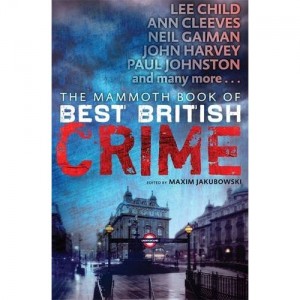 The anthology will be out in February of next year, and will feature my story ‘Wilkolak’, which first appeared in Crimewave #11, as well as the work of other stowaways from the fantastic genres Neil Gaiman, Joel Lane and Lisa Tuttle.
The anthology will be out in February of next year, and will feature my story ‘Wilkolak’, which first appeared in Crimewave #11, as well as the work of other stowaways from the fantastic genres Neil Gaiman, Joel Lane and Lisa Tuttle.
I’m getting a real kick out of being selected for this one. I love the crime genre and would love to write more in it. I get very nervous around the idea of trying though as I don’t feel I really know what I’m doing yet, especially when I see other writers ‘crossing over’ with such apparent ease. Joel Lane’s crime stories, for example, are just wonderful.
What appeals to me about crime writing is its potential for carrying as much complexity as you want within a compact form. The basic premise of any crime story is simple: something bad happened. But where you go with it after that is up to you.
I love what Barbara Vine does with that in The Brimstone Wedding. I love Patricia Highsmith’s The Blunderer, which tells the story of a murder that doesn’t happen. What Keith Ridgway does with the crime genre in Hawthorn & Child still occupies my mind on a daily basis.
The story I’m working on at the moment does have a murder in it. Is it a crime story though? I’m not entirely sure yet…
I’ve seen a few people blogging on this topic over the past week or so, and as a lover of lists I can’t resist posting my own. Actually I’m going to be a bit of a cheater and have six books instead of five. (Who came up with that paltry figure five, anyway?) The cover images I’ve chosen represent the covers of the editions as I first encountered them. In a very real way, these books chart my journey towards becoming a writer.
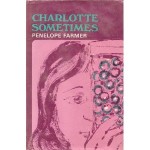 1) Charlotte Sometimes, by Penelope Farmer.
1) Charlotte Sometimes, by Penelope Farmer.
I can’t remember exactly how old I was when I first read this – eight, maybe, ten? – but I do know that although I never owned my own copy of the book I must have read it at least a dozen times. It was one of those books I would take out from the library on a regular basis, a book I never seemed to tire of and thought about a lot, even outside of those times when I was actually in the process of reading it.
It was also one of my first introductions to the idea of fantastic literature.
I had no idea then that there was such a thing – I didn’t really understand the concept of genre at all until I was in my twenties, there were simply books, books that I loved. All I knew was that this book – about a girl who swaps places in time with her spiritual twin – compelled me, obsessed me, and that I was desperate to read other books that were like it. In time I did. The books that took over my brain during my later childhood and very early adolescence were all novels of the fantastic: Penelope Farmer’s kind-of prequel to Charlotee Sometimes, The Summer Birds, Rumer Godden’s A Doll’s House, Catherine Storr’s Marianne Dreams, Hilda Lewis’s The Ship that Flew, Phillippa Pearce’s The Shadow Cage, Diana Wynne Jones’s The Ogre Downstairs. Even now my heart clenches when I think about these books, which seemed to chime in precisely with the way I was beginning to see the world, and that gave me my first very tentative sense of what it might mean to be a writer. As I grew a little older I discovered Alan Garner’s The Owl Service, Peter Dickinson’s brilliant ‘Changes’ trilogy and most importantly of all John Christopher’s The White Mountains, The City of Gold and Lead and The Pool of Fire. (I was totally crazy about the tripods, and read the trilogy – always in order! – as often as I read Charlotte, perhaps more.) The next step up was Golding’s Lord of the Flies.
It’s interesting to look back on these reading choices now and see how important they truly were and how they still matter. The novels I graduated on to – the Changes, the Tripods – are all books that describe and extrapolate an external catastrophe, a situation that is forced on to the novel’s protagonists from without. My preoccupation with what were effectively dystopian SFF novels clearly signalled my nascent awareness of and interest in the world outside and the politics that governed it, the concepts of freedom and change. These interests intensified as I grew older. And yet the earler fantasy books, classic works of fiction by Farmer and Wynne Jones, which deal more with internal issues of identity, freedom of thought and creative expression, contain within them many of the themes that are now central preoccupations within my own writing.
This group of mid-century British women who wrote what I like to call realworld fantasy (the type of fantasy that has always interested me most) – Farmer, Pearce, Uttley, Storr, Godden, Nesbit, Gardham, Bawden, Wynne Jones – remain a hugely important and fascinating group of writers, who have not yet been given the full weight of critical attention they deserve.
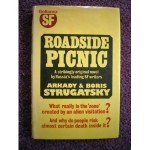 2) Roadside Picnic, by Arkady and Boris Strugatsky.
2) Roadside Picnic, by Arkady and Boris Strugatsky.
I wish I had a clearer memory of what it was, exactly, that made me start reading SF. I suppose it could have been my obsession with Doctor Who, but then I was kind of obsessed with Doctor Who – I knew I needed these kind of stories – before I even knew it existed. I studied Brian Aldiss’s landmark Penguin Anthology of Science Fiction for ‘O’ Level and was crazy about it, but – unlike most of the other kids in my class – I was already reading speculative fiction by then, anyway.
However and whenever it happened, what I do know is that from the age of about thirteen right up until I went to uni I read a lot of SF, more SF than anything else by miles, and most of it in the form of Gollancz ‘yellowjackets’ – my local library had a lot of them, and thoughtfully placed them all together on a single shelving unit. Aldiss, Pohl, Watson, Shaw, Clarke, Heinlein, Zelazny, Silverberg, Budrys, Azimov – I read them all. I loved Arthur Herzog’s catastrophe novels, Edmund Cooper’s weird kind of hippies-in-space stories, Hugh Walters’s series of space adventures for young adults. In the bookcase at the top of our stairs I discovered my mum’s odd little stash (odd because it was the only SF she ever read) of John Wyndham novels and promptly became obsessed with them, too. Towards tbe latter end of this period I discovered Orwell’s 1984, Zamyatin’s We, and Huxley’s Brave New World. I suppose you could say that it was these three novels that formed the cornerstone of my next stage of reading, but the book, the wonderful book that I carried over from this time and that still remains an inviolate touchstone for me is Roadside Picnic. I read everything I could find by the Strugatskys – I’d just started to discover Russian literature and I found the concept of Russian SF hugely exciting – but Roadside Picnic was for me and remains the most achieved and the most timeless of their remarkable works. It did things with narrative structure and point of view that I’d not encountered before. It described an alienated, oddly gifted, embittered and ocasionally ruthless anti-hero who was very much my kind of protagonist. It had some gloriously weird shit in it – the detritus that litters the Zone has never lost its magic for me – and yet it never felt the need to explain it, or explain it away. The stuff was just there, the central thrust of the novel remained with the characters, how they chose to react to and adjust to threat and change within their world.
I love this book. If I could have written any classic work of science fiction, this would be it.
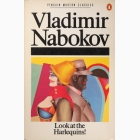 3) Look at the Harlequins! by Vladimir Nabokov.
3) Look at the Harlequins! by Vladimir Nabokov.
I read Russian at uni, and my experience of Russian literature has left a huge and lasting impact on my intellectual and creative life. For the space of about ten years, my whole way of thinking about literature was shaped and guided by the Russian classics, and I cannot imagine my mind without them in it, but, as the Strugatskys became the ‘carry-over’ from my Golden Age SF period, so the writer who became the ‘carry-over’ from my student days was Vladimir Nabokov.
I think every writer needs a ‘god’. Your ‘god’ figure should not just be someone you admire – you should have plenty of role models already – but a writer whose work you recognise as unassailable, as being so far in advance of your own potential achievements that even if you were to work your arse off for a hundred years you could never come close to matching it. The purpose of this is to keep you striving and to keep you humble.
Reading Nabokov has given me some of the most intense intellectual and artistic pleasure of my life. His facility with language – or should I stress languages – remains unmatched, yet he is also a very human writer, a writer whose main subject is god-in-art, the preservation of memory and the suspension of time through the creative act, which symbolises the essence of what it is to be human. There is indeed a great deal of humour and some of the most delicious literary irony ever in Nabokov, but I’ve always thought those who emphasise the ‘trickster’ element of Nabokov at the expense of the human are missing out badly.
It’s hard to pick a favourite among his novels because I love them all. From the Russian period my favourites are The Luzhin Defence (perhaps the greatest chess novel of all time), Glory and The Gift. The second half of his career is just one work of genius after another. Ada is perhaps his most ambitious work, Pale Fire is perhaps his crowning literary achievement, but I have such a soft spot for Look at the Harlequins, which in addition to its sparkling metafictions (it’s a cheeky and brilliant exercise in fictionalized autobiography) has an elegiac quality that makes me catch my breath and weep each time I read it.
4) The Affirmation, by Christopher Priest.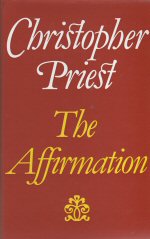
I more or less lost touch with SF while I was at uni. I first came across the work of Christopher Priest when I was in my mid-twenties, and a friend recommended me to read A Dream of Wessex.
I was completely blown away by it. In all my previous experience of SF, I’d never come across a book like it, had no idea that SF like this – set in a world that was recognisably ours, in a time that if not identical with our own still felt familiar – was being written now, and yet somehow it seemed to be precisely the kind of SF I was looking for. With its acute sense of place, its twisted intimacies, it was also distinctly British and unnervingly real – the novel’s method of subverting ordinary realism seemed a natural extrapolation of some of the qualities I’d previously admired in John Wyndham’s novels, the clarity of expression and force of intellect felt similar to some of what I’d found in Orwell. Yet there was more – a poetry, a mysteriousness – that was entirely its own.
I knew nothing about Christopher Priest, only that I wanted to read more of him. I’d never even heard of SF’s New Wave, and nor did I for another decade. But I did actively begin to seek out more novels by this amazing writer. The Affirmation, when I read it, seemed to me to be a kind of template for the perfect speculative fiction novel. Beautiful as a poem, provoking as a tract of philosophy, and in formal terms so perfectly realised I literally slapped the book’s cover with delight as I read the last (half) sentence.
The Affirmation was the book that properly opened my eyes to the infinite literary possibilities of speculative fiction, opening the gateway to my passionate rediscovery of SF in my thirties, and of writers such as M. John Harrison and J. G. Ballard, Michael Swanwick and Andrew Crumey. It was another six, seven years at least until I met its author.
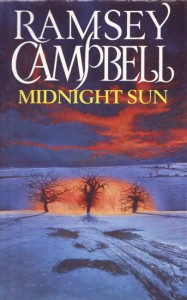 5) Midnight Sun, by Ramsey Campbell.
5) Midnight Sun, by Ramsey Campbell.
It was weird when I finally began to take my writing seriously, or rather I was. I knew – far more by instinct than by design – that what I wanted to do was write speculative fiction. In spite of the fact that I’d read more or less no SFF for a decade and more, it was, as it always had been, the speculative, the fantastic that compelled and drew me, that made me jealous as a reader and ambitious as a beginning-writer. And yet I knew next to nothing about it. I had no idea of who the new writers were, what people were doing now. Throughout my life, whenever I’ve begun to get interested in something, my natural first instinct has been to read about it, and that is what I set about doing. I read anthologies and discovered some new writers that way. I also devoured a large number of histories of the genre, and books about writing by writers who wrote speculative fiction. A book that became indispensible to me at that time was Stephen King’s Danse Macabre, which I loved as much for its author’s inimitable narrative voice as for what I learned from it about the weird film and fiction of the twentieth century.
In the chapter on British horror writing, King mentioned a writer who’d been new to him at the time, a Liverpudlian named Ramsey Campbell who’d begun his career publishing homages to Lovecraft but who had evolved into something quite different and completely original.
It’s so strange to think of it now, but back then I’d never heard of Shirley Jackson (who I shall call horror’s Chekhov) or Robert Aickman, voices of the Southern Gothic such as Flannery O’Connor and Carson McCullers, Arthur Machen or Algernon Blackwood. I’d read very little Lovecraft or Poe. I’d read Joyce Carol Oates’s essays but not yet her fiction. The novels and stories and critical writings of Ramsey Campbell were my gateway to all of these and more. More even than that, it was Midnight Sun in particular – there are few finer examples of the literary strange – that somehow told me that I could do this, that it was OK to go for it, that if I worked with a tenacity sufficient to match my desire I could find my own voice as a writer and that voice could be serious and achieved.
Midnight Sun possesses both the resonating harmonies of an ancient legend and the jagged cadences of contemporary literary expression. I still cherish a sneaking wish to write a horror novel, and if I could get anywhere near achieving the level of this wonderful and original exemplar I’d be a very happy writer indeed.
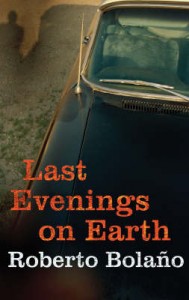 6) Last Evenings on Earth, by Roberto Bolano.
6) Last Evenings on Earth, by Roberto Bolano.
I first discovered Bolano about six years ago, when I was working in Foyles bookshop on Charing Cross Road and everyone suddenly started raving about The Savage Detectives. That was one hell of a big book, a novel I didn’t want to commit to until I had some inkling of whether I was going to like Bolano as a writer. I decided to start – as it’s useful to do – with his short stories, which is how I came to read Last Evenings on Earth.
I was outraged. I was of course fully committed to being a writer by then, publishing some stories of my own and trying to get to grips with the problems of writing a novel. Bolano’s stories seemed to disregard every single thing I thought I’d learned about how fiction should be written. They told as much as they showed, they went on and on about stuff and seemed completely unstructured. Most of them didn’t have plots.
But oh, these were wonderful stories! They were stories, the addictive, simply-must-hear-the-end kind of mad anecdotes some half pissed samizdat poet might get around to telling over the vodka one night during a pub lock-in. Yet they were also poetry, one limpid, amethyst sentence after another, tight with mystery and imagination and the immortal quest for human fulfilment and self expression. They were also sharply political, yet so non-didactic in their approach you often wouldn’t realise that until long afterwards.
Bolano was born to write. He was a natural, one of those writers in whom there seems to be no barrier between the mode of expression and what is expressed. Liquid intelligence.
I was hooked, bloody hooked and bloody jealous. God, that man could write.That man could even write about zombies. (No, I’m not joking – just check out his marvellous story ‘The Colonel’s Son’.)
Bolano’s writing is above all about freedom. Freedom to break the rules, freedom to become the kind of writer you want to be. Bolano wrote about writing, compulsively. He was a writer entirely devoted to his vocation, to recording his experience of it.
Bolano tells it like it is. He is inspiration.
In his Guardian review of Looper last Friday, Peter Bradshaw described Rian Johnson’s new film as ‘a gripping time travel sci-fi thriller’ and insisted that he left the press screening ‘dizzy with excitement.’
All as if the ideas and ambience and even the visuals of this movie hadn’t been tried and repeated and trotted out again and again for the past, what, thirty years?
I was looking forward to Looper (same way I was looking forward to Prometheus, I suppose). I came out of it just over an hour ago, fuming. Sadly, I was not dizzy with excitement, I was bored and pissed off.
I mean, seriously, could they not get any more rapid-action machine gun fire into that film?
I guess it’s me that’s the idiot here. I went into a pointless, high-concept Hollywood action thriller expecting thoughtful SF. Stupid mistake to make. No matter that Rian Johnson’s first movie, Brick, was a joy and a near-masterpiece. We’ve all seen what Hollywood money can do to talent – just go away and compare Memento with Inception. Was The Adjustment Bureau not enough to teach me a lesson? Was Source Code?
We’ve all seen Paul Kincaid’s excellent and insightful essay in the LA Review of Books, in which he argues that science fiction is ‘exhausted.’ It’s a great piece, a specific application and update of Joanna Russ’s 1971 essay ‘The Wearing Out of Genre Materials’, and every reader, writer and reviewer of SF should read and consider it. Whilst grinding my teeth in the cinema auditorium this evening, it couldn’t fail to attract my notice that Kincaid’s arguments might easily be applied to SF cinema as well as books.
It’s well known that there’s nothing truly new under the sun, that there are only seven basic story plots, or eight, or five, or whatever it is. But there are or at least there should be new approaches, original ways of seeing familiar things, an attitude that if not novel is at least personally resonant and emotionally real.
Off-the-peg films like Looper, which reiterate all the old genre stereotypes in the most middle-of-the-road way possible, are not it. I would argue that recent speculative movies such as Melancholia, Another Earth, Cafe de Flore, Seeking a Friend for the End of the World come much closer, that even when they go wrong (Cafe de Flore must have one of the dick-est protagonists of all time) they do so in the name of trying to carve out new territory. These are films that are at least prepared to risk saying something – and not necessarily at gunpoint.
All art should risk saying something – that’s what it’s for. Looper reminds me of one of those fake presents you see in department store windows around Christmas time – all that shiny paper with nothing inside. The ‘big ideas’ which are often seen by the wider public as the specific domain of SF can be problematical artistically – all too often what we end up with is generalisation, recapitulation, a big bland surface.
Perhaps what SF needs now to revitalise it is not the far-reaching, all-encompassing new idea, but for people to draw in closer to it, to narrow their focus, to work out which aspects of the fantastic speak most powerfully to them. To write about those, and to do so with courage and with honesty. Anyone who does that has originality guaranteed.
Or, to put it in language that the Jeff Daniels character in Looper might understand (did everyone keep expecting him to say ‘deal or no deal’ or was that just me?) for Chrissakes, people, show us some IMAGINATION here, will ya??
Back from FCon, which was, if anything, even more enjoyable and exhausting than last year’s. It was wonderful to spend time with friends (though it passed too quickly), to put more faces to more names – this last is for me always a particular delight. I want to say a huge personal thank you to Maura McHugh and Graham Joyce, who made my first experience of moderating a panel so much less daunting than it might have been, and to Joel Lane, who helped to make my participation in the ‘My Favourite Ghost Story’ panel a convention highlight for me. (Thanks, Joel, for not nabbing Aickman! I’d have been doomed else.) Above all, thanks once again to Marie O’Regan and Paul Kane for giving so much of themselves to all of us in making it happen. FCon 2012 was a great one. The quality of the panel discussions and programme events in particular this year was outstanding. It’s good to know that the World Fantasy Convention in 2013 is in such safe hands.
It’s also good to know we’ll all be gathering in Brighton again because I just love being there. It’s a magical place, not just beautiful and singularly atmospheric (though it is both these things) but also crammed with overlapping timelines and shades of nuance. The Brighton I was taken to as a kid is not the Brighton I visited in my twenties is not the Brighton I am finally coming more fully to know now. These several Brightons are light years from the Brighton that existed between the wars and afterwards, the Brighton of the trunk murders, the place Graham Greene immortalised in Brighton Rock, yet – and this is what I love about urban landscapes – all these cities occupy the same physical space, all are, in some essential fashion, still there. I snatched an hour before the announcement of the British Fantasy Awards on Sunday to wander around Kemptown and suddenly, without meaning to look for it and not even thinking about that time particularly I found myself standing outside the house where good friends of mine lodged in the 1990s when they were studying for their TEFL certificates. (They did eventually gain those qualifiications, though as I remember it a lot of their time seemed to be taken up with scripting and shooting home horror movies.) Coincidences like that always please me greatly because they seem to prove something or other, the thing (whatever it is) that I’m constantly trying to examine in my stories. Memory, and the permeability of time, the way the two are linked, perhaps. These are special moments.
The much-publicized revamp of the British Fantasy Awards seems to have been highly successful and looks set to continue as such, especially now that the weird anomaly of the Best Novel category has been sorted – it’s been decided (a vote was taken at the AGM) that as of next year there will be two separate shortlists, one for Fantasy and one for Horror. In his speech at the awards ceremony James Barclay took every opportunity to emphasise how much he (and the other jurors) had enjoyed being involved, how he’d been inspired by the shortlisted works and reminded of just how exciting it can be to have the opportunity and the excuse to get stuck right into a goodly pile of brand new books. Sarah Biggs (Rob Holdstock’s partner) inaugurated the first Robert Holdstock Award for Best Fantasy Novel with a moving personal reminiscence, a fine and fitting end to a fabulous weekend.
The very first Holdstock Award was won by Jo Walton’s already much-garlanded coming-of-age novel Among Others. This interested me, because this book really does seem to have touched people and it’s fascinating to debate and analyse why that might be. Among Others was one of the first books I read this year. I’d heard a lot of good things about it and the premise attracted me. In the event, the novel divided my opinion. I would say that Michael Levy summarized the problem perfectly in his sensitive review of Among Others at Strange Horizons:
What I would and could say about Jo Walton’s new novel, Among Others, in a less specialized venue, like a newspaper or a general review magazine such as Publishers Weekly, is very different from what I can and will say about it here, in Strange Horizons. Walton’s story is very much one for insiders, for us—the initiated, the Slans, or, to be a little less egomanical, for those of us who grew up lonely among non-readers, non-SF readers or, well, among others.
Some have cited this aspect of the novel – its insiderness – as a luminous strength. I am forced to admit that personally I perceive it as the book’s chief weakness. As a reader and as a science fiction reader since way back when, I enjoyed the novel rather a lot. But all the time I was reading it I couldn’t help wondering how it might come across to someone who’d read little or no SFF. Rather than try to communicate to an outsider exactly what it is about science fiction that sets her on fire, Walton’s narrator Morwenna seems simply to name-drop, to scatter the titles of books and the names of writers willy-nilly, barely brushing the surface of their textual significance. Perhaps my concern is misplaced – it could be that non-geeks can understand the spirit, if not the letter of this novel perfectly well, and if so then I’m glad, because in many ways it is, as Levy maintains, ‘a lovely book.’ But in either case there should be no special pleading. I believe very strongly that any serious work of SFF should aspire to stand shoulder to shoulder with mainstream literary works. A reader should not have to have prior knowledge of a ‘secret language’ in order to appreciate or understand it. Such narrow exclusivity would be to any novel’s detriment.
For me, the aspect of Among Others that shines out, that counteracts a lot of my objections, is the narrative voice. Mori feels alive and breathing from page one, and the particular Welsh lilt of the narrative, the lift and rhythm of Mori’s sentences, is an absolute joy. The book is beautifully written, the family relationships and the sense of place are wonderfully realised. There are flaws in the plot – the book’s climax, such as it is, feels weak – but that’s not what Among Others is about.
Perhaps the secret of this novel’s success is simply that people love books about books. I know because I’m one of them and it’s not something I’m going to argue against. It’s clear that Among Others was written with passionate commitment, that for its author it was a book that mattered very much. It’s for this reason more than any other that from this year’s BFA shortlist it was my preferred winner.
Oh, and before I post this post, so to speak, Ben and Jon at Solaris Books remind me to remind you that Lavie Tidhar, who very deservedly took the BFA for Best Novella with Gorel and the Pot-Bellied God, will be appearing at Foyles this Thursday to talk about his amazing novel Osama (the new Solaris paperback edition is being launched at this event) and the impact of 9/11 on his writing generally. The event begins at 6.30 and it’s free – just email the events department at Foyles to reserve a place.
I’m really looking forward to this one.